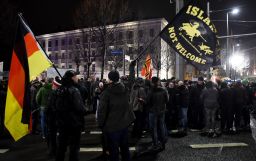Story highlights
PEGIDA leader Lutz Bachman convicted of inciting hatred
Anti-immigrant feelings have been on rise in Germany, once an oasis for refugees
A German court has convicted the founder of an anti-immigrant group of hate speech.
Lutz Bachmann, who once posed as Adolf Hitler in a selfie and coined verse about the Ku Klux Klan, was found guilty Tuesday of inciting hate speech on Facebook, said Birgit Kleeve, spokesperson for the district court in Dresden, Germany.
Bachmann was first charged last October of posting Facebook comments describing refugees, mostly Muslims, as “cattle,” “filth” and “scum.”
He was sentenced to a fine of €9,600. He will not face prison.
The court said Bachmann openly insulted the human dignity of refugees who came to Germany from war-torn countries, maliciously acting and inciting hatred against them.
Bachmann. 43, is the founder of the German group Patriotic Europeans Against the Islamisation of the West. The group, known as PEGIDA, organized anti-immigration rallies that drew thousands of people and has adherents in neighboring countries.
He opposes German’s refugee policy, which welcomed more than 1 million asylum seekers in 2015.
He briefly stepped down as chairman of the group in January 2015 after a newspaper published a selfie of him made up as Hitler. He claimed the selfie was satire.

Bachmann resigned after the backlash from the Hitler photo, as well as another image Bachmann posted of a man in a Ku Klux Klan robe with the caption, “Three K’s a day keeps the minorities away.”
He said the Hitler photo was for the publication of the audiobook of the satire “He’s Back.” “You need to be able to joke about things now and then.”
“He’s back,” or “Er ist wieder da” in German, is a 2012 best-selling satire based on Hitler waking up in modern-day Berlin with no knowledge of what happened after World War II.
“I apologize to everybody who has felt attacked by my online postings. They were comments made without serious reflection, which I would no longer express today. I am sorry that I thereby damaged the interests of our movement,” Bachmann said in 2015. He resumed the chairman post a month later.
Anti-iMuslim movement grew after starting small
The city of Dresden, which suffered some of the worst bombing of World War II, has been at the vortex of the anti-immigrant movement.
The Dresden protests began in 2014 when Bachmann, a former professional footballer with a criminal record for burglary, assault and drug dealing, posted a Facebook rant against Turkish immigrants in Germany.
The first few PEGIDA demonstrations drew massive counter-rallies that far outnumbered the anti-immigration crowds. But the PEGIDA movement has not only outlasted its opponents, but it also is growing, fueled in part by public fears of the ongoing refugee crisis.
“Every Monday night we come to gather peacefully. We are not Nazis,” a man said in October. “We don’t want to be labeled as Nazis and we don’t want to be painted into the right-wing corner. We just don’t want to become strangers in our own country.”
Hate crimes on the rise
Government data shows that the vast majority of refugees are from Syria and Iraq. But the second biggest group of migrants come from Albania, which the government does often deport.
As the public fears grow, there has also been a surge in anti-immigration acts across the country, especially arson attacks on refugee shelters. According to “Courage Against Violence,” a group monitoring hate crimes in Germany, most attacks are taking place in the south, where refugees initially enter, but also in the east of Germany, where refugees and migrants make up less than 1% of the population.
Germany began tightening immigration rules this year after criticism surrounding mass robberies and sex assaults on New Year’s Eve in Cologne and elsewhere, which spurred a debate about immigration policy.

German authorities later identified 18 asylum-seekers among the suspects in mass muggings and gropings in Colgone, including nine Algerian nationals, eight from Morocco, five from Iran and four from Syria, Interior Ministry spokesman Tobias Plate said.
